Camel Valley: Award-winning, world-class wines
6th January 2023
Award-winning, world-class wines from a beautiful corner of Cornwall. Second generation winemaker, Sam Lindo, turned his back on a city career and moved back to his parents’ vineyard where he grew up. The enterprise is now run as a real family affair, and a true labour of love which shows in the award-winning wines produced. Rachel Hicks writes.
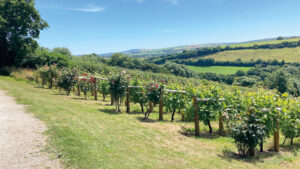
Camel Valley is on a south-facing site, 20–50m above sea level. There’s a tiny northerly strip running from Newquay to Camel Valley which provides the perfect climate for growing grapes, explains Sam.
Grower profile:
- Total vineyard size: 33ha, with 7ha under vine
- Soil type: Classic loam
- Aspect: South-facing, 20–50m above sea level
- Varieties: Seyval, Reichensteiner, Bacchus, Pinot Noir, Dornfelder, Rondo and Chardonnay

Bob Lindo and his son Sam
Ex-RAF pilot Bob Lindo and his wife Annie bought their Cornish farm in the 1980s, initially farming sheep and cattle and dabbling in barley and potatoes.
They had problems growing grass, as it’s a south-facing site with very well-draining loam soil. While this made it a difficult site for grazing due to the heat and dryness sending the grass brown regularly, the couple wondered if it might be ideal for grapes.
Taken by the idea, Bob ‘did a vintage’ in Germany, and the couple immersed themselves in viticulture books and courses. They planted 8,000 vines in 1989, and built a winery equipped with the best kit they could afford.
Their first vintage received a medal in the national English Wine competition, and more followed; with Camel Valley wines consistently winning medals at both national and international level. In 2002, the year their son Sam first returned to the vineyard from a career in the city, Bob and Annie won the Waitrose Drinks Producer of the Year award. Bob’s finest moment came in 2005 when he was awarded an International Wine Challenge gold medal for Camel Valley ‘Cornwall’ sparkling wine.
Now Sam, a maths graduate, has taken over from his father as winemaker, although he says his dad still whispers in his ear now and then.
Sam worked at a top winery in New Zealand in 2006 and brought back a lot of what he learned there, and has followed in his father’s award-winning footsteps. In 2007, he won the UK Winemaker of the Year award, as well as the Wine of the Year trophy, and Sparkling Wine trophy in the UK Vineyards annual competition for English wines judged solely by Masters of Wine. Sam retained the coveted Vintners trophy for the best UK English sparkling wine and another three trophies in 2008.
However, the best was still to come, and in 2009 Sam won the trophy and a gold medal in the International Wine Challenge for Camel Valley Bacchus. Simultaneously, he won a gold medal in the Decanter World Wine Awards for Camel Valley Sparkling ‘Cornwall’ Pinot Noir. Later in the same year, Sam won the English Wine Producers trophy and the Waitrose trophy.
Proving that wine really is in his blood, he then won the trophy for ‘Best International Traditional Method Sparkling Wine’ in 2010.
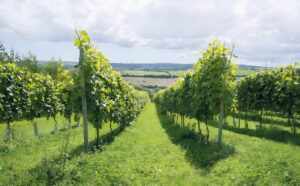
Total yield for the site is around 40t generally, with contracted vineyards providing a further 120t roughly.
Winning varieties
The varieties initially planted in 1989 by Bob and Annie were Seyval, Reichensteiner and Triomphe. The Triomphe was removed as it wasn’t very successful – it didn’t yield well, even in very warm years.
Currently, Seyval, Reichensteiner, Bacchus (planted in 2007), and a bit of Chardonnay (planted in 2020), along with Dornfelder (some of which was planted in 2002), Pinot Noir and Rondo are the varieties grown.
Camel Valley has 7ha under vine, with the entire site covering just over 33ha.
Part of the land is a nature reserve, and some is also used for grazing by the neighbouring farm.
Sam undertakes soil testing for the vines because, he says, the primary issue with Cornish soil is that it doesn’t retain alkalinity, so soils can become quite acidic if you don’t keep on top of it.
He uses a combined prilled liming fertiliser to increase the soil pH – Sam explains this is because lime is difficult to spread in its powder form, as there are no suitable spreaders for that kind of application in vineyards.
Weeds under the vines are controlled pre-season with a herbicide strip. After that, Sam keeps grass under control by mowing, but he says inevitably some weeds will enjoy whatever the year ends up being – while Camel Valley doesn’t have issues with any one particular weed, there’s always one variety which will have snuck past the herbicide application, spring flush or mowing; but the idea of cover crops, to Sam, just means extra work and expense so it isn’t something he’s interested in doing for soil health or weed control, as what he’s doing is effective currently.
In terms of pest control, Sam comments that the site is usually too cold for insects that like vines, which he says is a lovely position to be in.
Similarly, disease pressure is very light, as Camel Valley is the only vineyard in the local area, so the chance of disease starting and spreading is very slim. Mildew and botrytis are the only two which need controlling, but they haven’t yet had any significant losses to these, which Sam puts down to good canopy management and effective spraying, using the WineGB suggested spray programme each year which is based on updated ag-chem listings.
In terms of the larger pests, birds are the primary problem so they use nets which also help to keep any other animals out.
The vineyard is trellised and pruned within the Guyot system, and fruits are kept at waist-height which Sam finds easier to work with.
Any new trellis posts going into the ground now are metal, although the wooden posts from 1989 are still going strong – luckily for Camel Valley, wood back then was treated in a way that wouldn’t be allowed now.
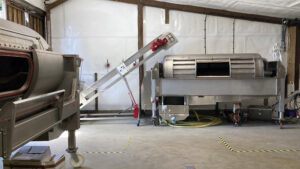
The fully-equipped winery is onsite, which increases efficiency, and the different varieties as well as grapes arriving from the various contracted sites are processed separately.
Very much hands-on
Machinery-wise, the vineyard has an Antonio Carrero tractor – the Rolls-Royce of vineyard tractors – as well as a vine trimmer, sprayer, orchard mower that will mow under the vines, and a flail mower that mulches the prunings and which is used to mow the spring flush.
Usually, they’ll see signs of buds swelling in March. April is when bud burst happens, which is when the frost risk is at its most dangerous and this risk doesn’t abate fully until mid-May.
The final herbicide spray is a desiccant that will be used to tackle the low down shoots, and then the team crown cleans by hand. The vines then grow quite quickly, and by the end of June/early July, the shoots will have reached the top wire and require tucking in.
Harvest usually begins in early October, although this year was a good couple of weeks earlier.
Harvest is entirely hand-picked, both because the rows were originally planted very much in Bordeaux width, which impacts on the machinery that can be used, and also because Sam says the size of the vineyard overall isn’t big enough to justify using a mechanical harvester.
While the vineyard has used contractors for harvest in the past, they now rely entirely on local pickers. Harvest each day is only undertaken in the morning, with 30-40 pickers working at once, then finishing at lunch time. This means the grapes can go straight to the winery in the afternoon to be processed. When using contractors, picking went on all day, with the fruit not entering the winery until late in the evening – so processing had to continue into the night, followed by an early start the next morning.
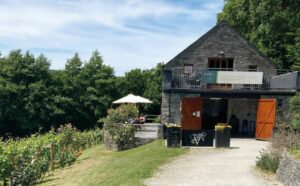
Camel Valley offers tours and wine by the glass, as well as cellar-door sales.
Perfectly positioned
Camel Valley is on a south-facing site, 20–50m above sea level. It’s only 10 miles from the coastline, but Sam says that in Cornwall this is the furthest away from the sea you can be but to the west of Bodmin Moor – so they’re in the warmest possible position, with the lowest rainfall, and don’t really suffer from any cooling from the sea.
On the MET office temperature maps for the west of the UK, there’s a tiny northerly strip running from Newquay to Camel Valley which provides the perfect climate for growing grapes, he explains.
The soil being loamy is generally considered to be unexciting in the wine world, Sam says, as you get more fruit in the wine and less of a local characteristic; but for Sam, starting from a low base, that fruitier finish is a benefit as it’s easy to work with. Camel Valley have other vineyards growing for them elsewhere in the UK, and all are growing on the same soil type on order to get that same fruit flavour. As such, none of their wines are made from grapes grown on chalk.
Camel Valley are very well known for their rosé sparkling, and also their Brut sparkling – they’ve won the award for best rosé sparkling in the world on three separate occasions. They offer a few other sparkling wines, as well as still white and rosé.
In general, they stick with producing the same wines. Sam explains there’s a sort of inevitability about what the wines are going to taste like, and how the grapes are going to be – which is usually on the side of unripe. Every year there will be a certain batch which might allow them to make a slightly different wine, but generally they pick to the same level of acidity, which is the same across all of the contracted vineyards who work with Camel Valley.
They pick each variety as soon as they’re ready to pick, rather than harvesting all varieties at once and doing a field blend. Each variety is fermented separately, and they don’t think about blending until after harvest – even the grapes arriving from other vineyards are kept separate from each other.
Total yield for the site is around 40t generally, with contracted vineyards providing a further 120t roughly. This leads to around 150,000 bottles being made on average, but this can vary hugely – for example this year, around 220,000 bottles were produced, while for comparison, 2018 saw 300,000, and in 2021 it was down to 110,000. It swings hugely from year-to-year.
This year saw good flowering, and the yield was higher than average, although not massive. Next year however Sam is hopeful for a good tonnage, with this year’s weather dictating a high number of good-sized flower bunches; so, if the weather next spring onwards allows, 2023 could be a very good year yield-wise.
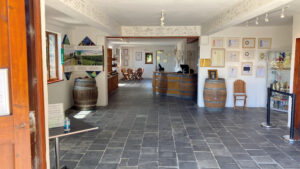
Marketing is very much organic, primarily the result of word-of-mouth recommendations, and tourists make up a large part of the visiting business.
Simple yet effective marketing plan
The vineyard employs six full-time-equivalent staff, covering the vineyard, winery, cellar-door visits and other sales.
Wines are sold in locations such as Waitrose, Fortnum & Mason, Rick Stein, the Tate Gallery, and more. All of the listings have been generated from people who have got in touch with Camel Valley directly, usually as a result of visiting the winery and enjoying the wines – so their key marketing plan is to make sure their cellar-door visits are how they want them to be and that customers enjoy them.
The wines are also stocked in various local wine shops in Cornwall and some further afield, as well as being sold directly from the vineyard’s website. Marketing for the vineyard is very much word of mouth. Holidaymakers visiting Cornwall are a large part of the customer base, and for Sam, Camel Valley is the content for other people’s social media rather than generating their own social media content.
The vineyard solely offers tours and wine by the glass, with no plan to add any diversifications. He’s happy with the size of the operation at the moment, as it allows them to provide excellent customer service as well as remain very much hands-on with the vineyard and winery, so has no plans to make any drastic changes currently.
Sam reckons people underestimate just how complicated it is running a vineyard, winery and cellar-door sales – saying it’s the equivalent of running five or six businesses all at once, so to try to add yet more to this would impact too much on how the business operates and add unnecessary pressure.
He says that when you throw into the mix issues like Brexit, Covid and the war in Ukraine, it would open up the business to even more instability and risk.
Sam is the official winemaker, but he explains that while he makes the final call, he doesn’t rely solely on his own palate. Lots of people taste and assess the wines before decisions are made, and Sam thinks it’s important that tastings include people who aren’t as close to the wines as he is.
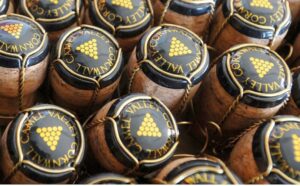
Wines are sold in locations such as Waitrose, Fortnum & Mason, Rick Stein, the Tate Gallery.
The sustainable dream
Camel Valley uses the traditional method for its sparkling options. Sam says historically, people saw this as the ‘best’ way to produce sparkling wine, but comments that the more they’ve learnt about Champagne and the techniques of production, you can see why Champagne went down this path a very long time ago.
With such a large number of parameters being so variable from year-to-year, he reckons keeping the wine in the same bottle that it will ultimately be sold in helps to keep production elastic – in comparison to having lots of tanks that sit empty for three quarters of the time, instead you have bottles being stored in a warehouse which can be used as needed.
Sam does comment, however, that this method is perhaps not the most sustainable way of producing sparkling wine and delivering it to the customer, but says that in order for it to become more sustainable, customers would need to embrace options such as premium wine being sold in cans, which he feels looks unlikely currently so they’re currently at a bit of an impasse.
Growing grapes and making wine up to the point where it’s all in the tank is a sustainable and carbon negative thing to do, but then we ruin it by putting it in a glass bottle and shipping it around the world. Many things have to change, but he wishes this could be accelerated to now so that he can better sleep at night.
